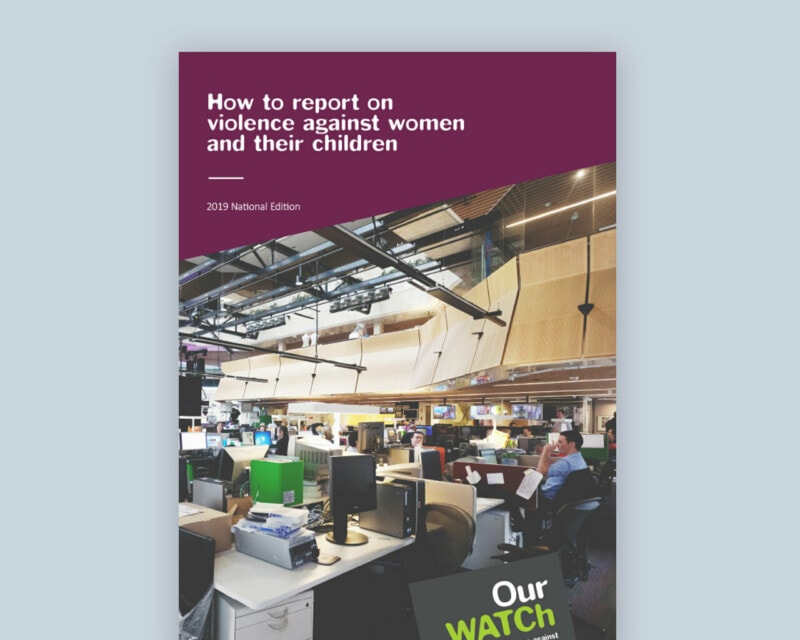On this page
Overview
Survivors play a critical role in the change needed to end violence against women and their children.
Some survivors, as well as their family and friends, want to share their stories in the media so their lived experience and expertise can contribute to the public conversation. Others do not.
When reporting on violence, remember that the survivors have been through trauma. The way you treat them and share their story may impact on their healing. Not all those impacted by violence want to speak to the media, and safety is an issue. Ensure they have access to support throughout the process of sharing their story.
Interviewing survivors who have undergone media advocacy training helps to ensure that women’s stories are shared in a safe, sensitive and responsible way. The Voices for Change program, for example, developed by Our Watch in partnership with Women’s Health East and VicHealth, supported women to share their stories of domestic and family violence.
When obtaining informed consent, be aware of the inherent power imbalance between media organisations and survivors which may impact on the voluntary nature of the consent process.
Find key statistics on violence against women in Australia.
Contacting a survivor for comment
Our Watch does not provide contact information for survivors.
If you’re a journalist looking for a survivor to provide comment on a story, contact local organisations directly to build relationships. The following organisations have trained survivor advocates, and may have further information about how to contact survivors for comment:
Brisbane Domestic Violence Service (Brisbane)
Domestic Violence NSW (Sydney)
Safe Steps (Victoria)
Safe+Equal (Victoria)
Embolden (Adelaide)
Ruah Community Services (Perth)
Engender Equality (Hobart)
Taking a trauma-informed approach to interviewing survivors
When interviewing survivors, it is important to focus on the process as well as the outcome. Consider the impact of the story on the survivor/s. Your interview and reporting may re-traumatise or inadvertently shame them. Talking to children who are survivors of or witnesses to violence can also be particularly risky.
A best-practice reporting checklist for protecting survivors
Before an incident happens
- Build relationships and trust with specialist services and survivor advocacy groups.
- Understand that services working with women and their children have relatively few resources, they probably won’t have people immediately available to tell their stories, and might not encourage survivor media engagement for safety reasons.
- Be aware that violence against women can take many forms and change over the period of a lifetime, for example, older women experiencing abuse by their adult children.
When a story breaks
- Avoid approaching survivors or their families in the immediate aftermath of an incident. At that time, they are still in shock and may be unable to fully comprehend what they are consenting to by speaking to you.
- Deal honestly with survivors and their families.
- Respect their right not to talk.
Before the interview
- Acknowledge current and emerging safety and ethical issues for survivors when they choose to tell their stories.
- Explain the risks, including identification, retribution, public backlash and online abuse.
- Discuss how sharing their story may affect legal proceedings.
- Explain the implications of being named or not named in public.
- Allow survivors to choose the interview location and bring a support person.
- Be aware of the power imbalance between you and the survivor, and seek to provide them with as much control over things as possible,
- Suggest they have a plan for the day the story comes out.
- Check if the survivor has legal and emotional supports in place throughout the process of sharing their story, and have a list of trusted accessible services on hand. If they do not have access to support services, see if your organisation’s EAP and legal advisors can cover them.
- Consider individual circumstances for accessing support, such as disability or employment status, living and/or working in a rural or remote location.
- Confirm they can access support on the day the story comes out and in the following period.
During the interview
- Give survivors as much time as possible to tell their story.
- Recognise and respect the survivor’s objective in telling their story and seek to reflect this in your reporting. Ask: ‘Why are you telling your story?’
- Ask open ended questions, such as: ‘What are you able to tell me about what happened?’
- Ask how they want to be identified and referred to, for example, as a ‘victim’ or ‘survivor’, ‘woman with a disability’, with their pronouns and any cultural connections.
After the interview
- Ensure you have informed consent to disclose elements of their story.
- Offer the opportunity to review the way they are referred to or quoted.
- Be transparent about how you will use their story.
- Explain what will happen after the interview, including fact-checking and the right to reply so that these are not interpreted as you ‘not believing’ their story.
- Assist survivors in preparing for media attention, including by providing advice on protecting their social media profiles.
- Keep survivors informed of when their story will go live, including any hold ups or changes.
- Check to see if there are any family or friends they need to tell before the story goes live.
- Stay in communication, particularly if there are changes to content or editorial approaches.
- Turn off comments on the published piece or warn the survivor if this is not possible.
- Confirm they know where to refer other survivors for professional support if they are contacted following publication.
For more information, see resources from the DART Centre Asia Pacific including Getting it Right: Ethical reporting on traumatised people.
Other sources for reporting
Specialist sources
Specialist sources include domestic, family and sexual violence organisations, services and academics. Violence against women specialists and survivors can add an important dimension to your reporting on this issue.
Violence against women specialists can talk about the nature of violence, why it happens, power and control, impacts on victims, accountability for perpetrators and systemic issues.
National domestic, family and sexual violence peak bodies and key organisations:
Our Watch (direct media contact: 0448 844 930 / media@ourwatch.org.au)
1800RESPECT – visit the 1800RESPECT service directory for more specialist organisations and services throughout Australia.
Australian Human Rights Commission
Australia’s National Research Organisation for Women’s Safety (ANROWS)
National Association of Services Against Sexual Violence
National Aboriginal Community Controlled Health Organisation (NACCHO)
Women with Disabilities Australia
Community sector services have relatively few resources and may be unable to provide comment at short notice. Building relationships with these services may help to facilitate more urgent requests for comment.
Police as sources
Police are important sources, but they are not the only sources. Police can describe ‘incidents’ of crime. While this can be useful, some problems with this include that:
- violence against women is usually non-criminal
- domestic violence is not a single ‘incident’ – it is a pattern of abuse
- most violence against women goes unreported.
Find more information to accurately report on crime statistics and understand the scope of police expertise here.
Community members as sources
Neighbours, friends, family and colleagues can tell you about their perceptions of the relationship, the perpetrator and the victim. This can be problematic because violence against women in the family context is often hidden – community members cannot know what happens ‘behind closed doors’.
Related

12 minute read
Understand legal issues relating to reporting on violence against women for journalists.

3 minute read
Evidence-based tips for journalists reporting on violence against women.